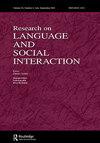Turning the Tables: Objecting to Conduct in Conflict Talk
IF 2.1
1区 文学
Q1 COMMUNICATION
引用次数: 5
Abstract
ABSTRACT This article is a Conversation Analytic study of occasions where a speaker formulates what a recipient is doing as something objectionable, thereby delivering an accusation, e.g., “Why you shouting” or “I dunno why you’re being so aggressive.” We call these lexical formulations of what someone has just done conduct formulations. These are: (a) responsive to an ongoing imputation of misconduct or misdemeanor, and (b) produced in response to an upgrade on prior attempts by the recipient to engage the producer of the conduct formulation in aligning with their project. The speaker thereby “turns the tables” on the recipient, challenging the legitimacy of, and thus rendering accountable, his line of action. The response by the recipient involves a downgrade of her prior action and so proposes resetting the terms of engagement on a more conciliatory basis. Data are in English and Italian.扭转局势:反对冲突谈话中的行为
摘要这篇文章是一篇对话分析研究,研究了说话者将接受者所做的事情表述为令人反感的事情,从而提出指控的情况,例如,“你为什么大喊大叫”或“我不知道你为什么这么咄咄逼人”。我们将这些词汇表述称为行为表述。它们是:(a)对正在进行的不当行为或轻罪指控作出回应,以及(b)对接受者先前试图让行为制定者参与其项目的升级作出回应。因此,发言人对接受者“翻盘”,质疑其行动路线的合法性,从而追究其责任。接收方的回应涉及对其先前行动的降级,因此建议在更具和解性的基础上重新设定参与条款。数据有英文和意大利文两种。
本文章由计算机程序翻译,如有差异,请以英文原文为准。
求助全文
约1分钟内获得全文
求助全文
来源期刊
CiteScore
7.30
自引率
7.40%
发文量
20
期刊介绍:
The journal publishes the highest quality empirical and theoretical research bearing on language as it is used in interaction. Researchers in communication, discourse analysis, conversation analysis, linguistic anthropology and ethnography are likely to be the most active contributors, but we welcome submission of articles from the broad range of interaction researchers. Published papers will normally involve the close analysis of naturally-occurring interaction. The journal is also open to theoretical essays, and to quantitative studies where these are tied closely to the results of naturalistic observation.

 求助内容:
求助内容: 应助结果提醒方式:
应助结果提醒方式:


